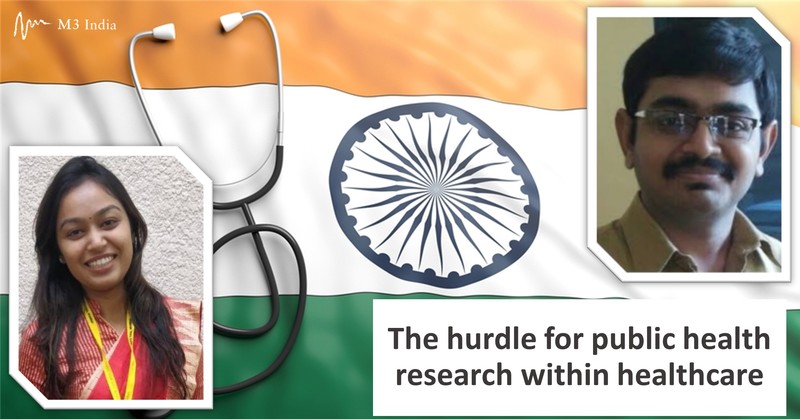'The hurdle for public health research within healthcare'- Dr. Soham D Bhaduri & Dr. Apurva Jain
M3 India Newsdesk Mar 11, 2020
Dr. Soham D Bhaduri and Dr. Apurva Jain provide an account on the current situation of public health research in India, which at times may include aspects of social science research as well, the lack of understanding of which may pose a huge challenge for independent researchers.

Social science research differs from biomedical research in a number of respects, which is often largely underappreciated by those making a transition from the purely biomedical sphere to that of public health. Public heath is inexorably rooted in social sciences, and this fact has increasingly become impossible to disregard. This is owing to the exposition of the complex and deep interconnections between the ‘medical’ and the ‘social’.
One of the most important differences is that the control knob of social science research often rests largely in the hands of study participants, and the line between the researcher and the researched lies blurred. Negotiating this, along with other important differences, poses a significant challenge for the novice public health researcher.
This challenge in India is often largely exacerbated due to the deficient environment for public health research, especially that which is founded on sound social science principles. This manifests in the form of considerable unfamiliarity of many novice and experienced public health researchers alike with the philosophical, procedural, and ethical imperatives of social science research, often eventually leading to questionable credibility of findings so generated.
A result is an over-reliance on extraneously-sourced research and often mindless extrapolation of their findings without consideration of context. An externality, which is readily apparent on the ground, is the deficient sensitisation of subjects to public health research and its significance.
Our recent attempt to pilot a study in Mumbai was a small testimony to the same. It involved two prime categories of participants:
- Health workers, comprising Anganwadi workers and personnel from one Urban Health Post; and
- Lay beneficiaries of government health services, which included children and their parents
Quite predictably some may say, we noted a general reluctance to provide information from the side of the health workers. This was more so with urban health-post personnel than with the Anganwadi workers, in our case.
The situation was, however, completely different in case of lay beneficiaries, who possessed fewer inhibitions and reservations about sharing even highly personal information. This is important since the perceptions and expectations novice researchers carry to the field are often the reverse.
What could be the possible reasons for the challenges?
Apart from being comparatively less formally educated, the Anganwadi workers would have been scarcely exposed to such surveys. Social science research involving grass-roots workers isn’t as popular a theme in India as lab-based research. Such encounters are rather novel for these grass-roots workers – hence their naivety in this regard is quite expected.
Undertakings such as surveys tend to kindle in them an initial suspicion - but development of a rapport with them is easier than with higher level workers, who are often persistently suspicious. Once such rapport was achieved, they were eager to discuss their work and achievements with pride and the challenges they faced with alacrity. Senior urban health post officials, on the other hand, were firm about not allowing the survey despite sufficient reassurance that nothing would go awry.
Not only did initial rapport-building pose a challenge, but formal procedures to obtain approval were arbitrary and ill-defined. Furthermore, a simmering suspicion about possible uncovering of loopholes and inadequacies strongly grasped them. Reassurances in the form of guaranteeing anonymity and not disseminating the findings in a sensational manner were in vain. Traversing these challenges appeared to be more formidable a task than conducting the survey itself.
Research done outside the parameters of government initiative would be particularly prone to challenges.
Studies initiated by the government can kindle trust among their subjects with relative ease and surmount resistance, but often stand chances of yielding less trustworthy findings due to the inherent conflict of interest. This warrants that the environment, particularly that within the health services system, be made more conducive to independent public health research in order to uphold scientific spirit itself.
Though this was one solitary instance and is not generalisable, it provides a glimpse of the bigger picture and the possible difficulties that could be encountered thereby.
Public health research is not always about factual questions but often revolves around subjective opinions and involves dynamic contexts, which not only makes the findings challenging to elicit but also exquisitely sensitive. Reluctance of the stakeholders to contribute to, and a general distrust of, such undertakings as surveys would pose a serious challenge for public health research in the country. A perception needs to be cultivated outside and particularly within the health system that public health research is indispensable for its very own betterment and not an activity to expose individual failures and shortcomings.
Disclaimer- The views and opinions expressed in this article are those of the author's and do not necessarily reflect the official policy or position of M3 India.
Dr Apurva Jain is a Mumbai-based Dentist and an aspiring public health professional.
Dr Soham D. Bhaduri is Editor, The Indian Practitioner, and a healthcare columnist.
-
Exclusive Write-ups & Webinars by KOLs
-
Daily Quiz by specialty
-
Paid Market Research Surveys
-
Case discussions, News & Journals' summaries